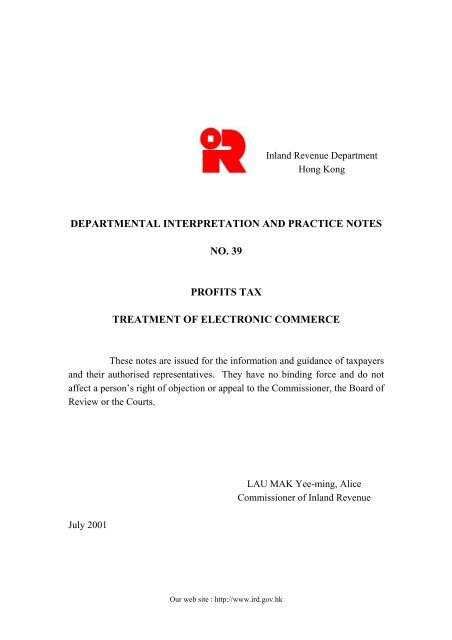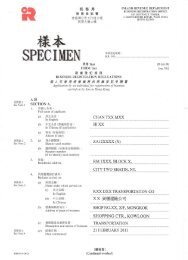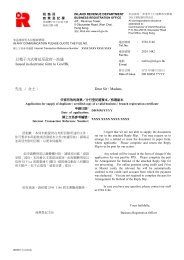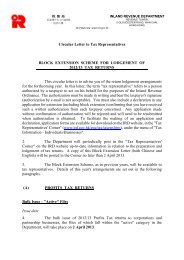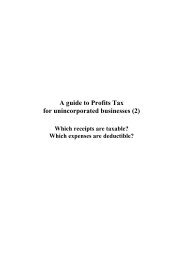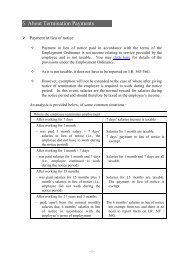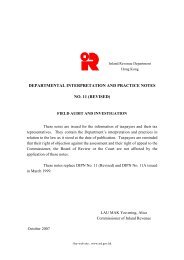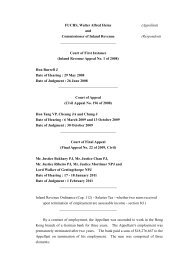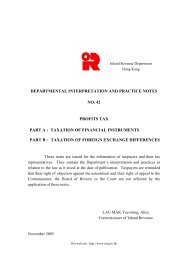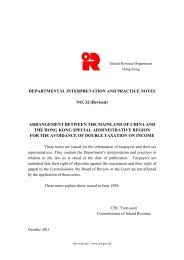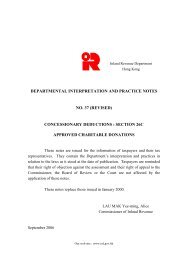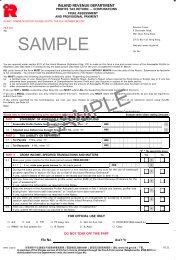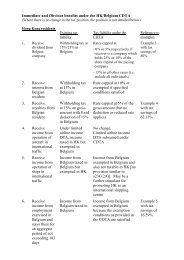Departmental Interpretation And Practice Notes - No.39
Departmental Interpretation And Practice Notes - No.39
Departmental Interpretation And Practice Notes - No.39
Create successful ePaper yourself
Turn your PDF publications into a flip-book with our unique Google optimized e-Paper software.
the terms of Rule 5 in Hong Kong, there can be no doubt that the non-residentis carrying on a trade or business in Hong Kong (although the presence of a PEis not essential for reaching such a conclusion). Where such a person derivesprofits from Hong Kong, Rule 5 provides for the basis of computing theperson’s profits assessable to Profits Tax.11. With the development of EC the question has arisen as to whether anon-resident person selling products through a server it owns or rents andoperates in Hong Kong should be regarded as having a PE here. However, itis commonly understood that the words “branch, management or other place ofbusiness” in Rule 5 imply the presence of a physical place and personnel.Accordingly, the Department will generally accept that the mere presence of aserver does not constitute a PE.12. The concept of PE is also a common feature in double taxationagreements. In this regard, it is pertinent to briefly mention the position of theOrganisation for Economic Co-operation and Development (OECD). Theposition taken by the OECD is that a server at the disposal of a business (i.e.owned or rented by it) can only be regarded as a PE of the business if anessential and significant part of its business activities are conducted through theserver. This is the case even if no personnel of the business are required at theserver’s location for the operation of the server. However, the OECD’sconcept of PE is mainly relevant in the context of tax treaty arrangements andits definition of PE is worded slightly differently from that of the InlandRevenue Rules. In relation to the interpretation of domestic law, theDepartment holds the view mentioned in paragraph 11 above and will continueto apply established tax principles and practices.THE LOCALITY OF EC PROFITS13. The Ordinance does not contain a comprehensive set of source rules.Consequently, in order to determine the source of particular profits, guidance isoften obtained from judicial precedents. In this regard, the courts have oftenstated that the determination of source is a practical hard matter of fact.Furthermore, the courts have tended to emphasize certain factors as beingrelevant in determining the source of particular types of income. In DIPN No.21, on the locality of profits, some of the particular factors are illustrated on a4
oad principle basis. The <strong>Practice</strong> Note is equally applicable in deciding thelocality of profits where EC is involved. In general terms, however, it mustbe stressed that the proper approach to be taken in determining the locality ofprofits is to ascertain what were the taxpayer’s operations which produced therelevant profits and where those operations took place.14. In the context of EC, business operations are commonly automatedto a significant extent, with the consequence that physical activities arecomparatively reduced. A business may use a server to provide acommunication linkage between trading parties for a variety of purposes. Forexample, a server may be used by a business to give information about itsproducts and services, to process on-line purchase orders, to deliver digitizedproducts or services electronically, or to process payments. All theseactivities may be automated and carried out using a server located outsideHong Kong. However, the place where these automated server-basedactivities are carried out does not, of itself, determine the locality of profits.They have to be weighed against the core business operations required toconduct the EC transactions, which are usually carried out within a physicaloffice (including operations arising from the need to automate, manage andcontrol the virtual shop-front or back-office). It is also relevant that,irrespective of the EC model adopted, it is usually the case that tasksundertaken through a server are performed according to pre-designedapplication software; the server cannot function by itself; and human controlremains important in carrying on the overall business operations. TheDepartment therefore takes the view that it is generally the location of thephysical business operations, rather than the location of the server alone, thatdetermines the locality of the profits. In other words, the proper approach isto focus more on what and where the underlying physical operations werecarried out by the taxpayer to earn the profits in question than on what hadbeen done electronically.15. Decided cases suggest that in ascertaining the locality of a person’sprofits, it may be necessary to have regard to what the person’s agent has done.The term “agent” can refer to either a natural person or a legal person, but doesnot include software or a server, no matter how advanced it is. Nor can anInternet Service Provider who merely operates a server under a web-sitehosting arrangement be regarded as an agent for this purpose.5
16. In relation to the locality of profits, it is relevant to mention that inHK-TVB International v. CIR 3 HKTC 468 Lord Jauncey, at page 480, statedthat –“ It can only be in rare cases that a taxpayer with a principalplace of business in Hong Kong can earn profits which arenot chargeable to profits tax under section 14 of the InlandRevenue Ordinance.”In Magna Industrial Company Limited v. CIR 4 HKTC 176 the Court ofAppeal also referred to the same statement and stated, at page 259, that “As amatter of common sense, this must be so.” Whether a case containsexceptional features which put it into the “rare case” category depends, ofcourse, on all the facts of the case.17. As a general proposition, where the principal place of businessoperations of a company engaged in EC is in Hong Kong, profits earned by thecompany will be liable to Profits Tax. By way of illustration –(a)(b)A company which has all of its business operations in HongKong apart from operating a server (intelligent or otherwise)which is at its disposal and located outside Hong Kong for ECpurposes will be liable to Profits Tax.A company which has all of its business operations outsideHong Kong apart from operating merely a server (intelligentor otherwise) which is at its disposal and located in HongKong will not be liable to Profits Tax.18. The following examples further illustrate the Department’s views onthis aspect.6
Example 3 : Manufacturing businessA manufacturer of watches, which has its principal place of business in HongKong, operates a server (at disposal) located outside Hong Kong. Throughthe server, customers obtain details of the company’s products and prices,negotiate with the company for purchases, order goods, and make payments.The company’s operations in Hong Kong include preparing information for theserver, answering enquiries from customers, procuring supplies for itsmanufacturing operations, manufacturing its products, making deliveryarrangements for the finished products. Again, as the activities which insubstance give rise to the company’s profits are carried out in Hong Kong, thecompany is liable to Profits Tax. Conversely, if the manufacturer were tocarry on the business outside Hong Kong and merely operate the server locatedin Hong Kong, the profits made would not be chargeable to Profits Tax.CHARACTERIZATION OF INCOME19. Section 15(1) of the Ordinance specifies a number of “sums” that aredeemed to be receipts arising in or derived from Hong Kong from a trade orbusiness carried on in Hong Kong. It follows that even if a person is notcarrying on a trade, profession or business in Hong Kong, the person may stillbe liable to Profits Tax under this deeming section. However, section 21Aprovides that the assessable profits in respect of sums which are chargeableunder section 15(1)(a) or (b) shall simply be taken to be 10% of the grossamount (100% if the amount is derived from an associate). It follows,because the computations of assessable profits differ, that it may be importantin relation to the taxation of EC to ascertain whether sums have actually beenderived by a person carrying on a business in Hong Kong or are onlychargeable as royalties or licence fees that fall within section 15(1)(a) or (b).20. Section 15(1)(b) is particularly relevant in the context of EC. Thissub-section applies in respect of –“ sums, not otherwise chargeable to tax under this Part, received byor accrued to a person for the use of or right to use in Hong Konga patent, design, trademark, copyright material or secret processor formula or other property of a similar nature, or for imparting8
or undertaking to impart knowledge directly or indirectlyconnected with the use in Hong Kong of any such patent, design,trademark, copyright, secret process or formula or otherproperty”.Whether a particular sum should be regarded as having been received for theuse of or the right to use intellectual property of a kind mentioned abovedepends on the terms of the agreement between the parties concerned, takinginto account all the circumstances of the case.21. For the purpose of characterizing income from an EC transaction, themain question to be addressed is the identification of the consideration for thepayment to the non-resident person. If the payment is in truth a payment for aproduct or service, it will not come within the scope of section 15(1)(b). Onthe other hand, if it is a payment for the use of, or the right to use, copyrightmaterial, it is deemed to be a taxable receipt under section 15(1)(b).22. Difficulties in characterizing a payment may arise where the relevantagreement involves the acquisition or use of computer software or other digitalproducts. In such a situation, it is important to draw a distinction between apayment for the use of or the right to use the copyright which subsists in thesoftware program (where section 15(1)(b) would be applicable) and a paymentfor the use of or right to use only the actual software program (where section15(1)(b) would not be applicable). Examples of the former kind are the rightto make copies for distribution to the public; the right to prepare derivativeprograms; the right to make a public performance of the program and the rightto publicly display the program.23. The distinction can be further explained by reference to pre-packed(shrink-wrapped) software. For this type of product, the contract wouldgenerally only grant the customer a licence to use the software to a limitedextent, i.e. to use the software either on a single computer, or on a specifiednumber of the customer’s computers or network servers. Further, thecustomer would not have the right to reproduce, modify or adapt the softwareprogram, or otherwise exploit the copyright in the software. As the paymentfor such a software is for the simple use of it, not for the acquisition of anyright to use the copyright, the payment is not regarded as a royalty for ProfitsTax purposes. For digital software downloadable from the Internet, its status9
However, if instead the Hong Kong customer were to acquire the right tocommercially exploit the copyright material in the digital product, the paymentwould fall within the ambit of section 15(1)(b) if made to a non-resident personnot carrying on business in Hong Kong. In addition, the Hong Kongcustomer would have a “withholding tax obligation”. On the other hand, ifpaid to a commercial provider carrying on a business in Hong Kong, thepayment would be brought to charge under section 14 of the Ordinance.Example 5 : Application hosting arrangementsA Hong Kong customer who is the owner of, or holds a licence to use, asoftware product pays a “non-resident person” to upload the software to aserver (located outside Hong Kong) which is owned and operated by thenon-resident person. The non-resident person does not carry on business inHong Kong. Technical support and maintenance of the server is provided bythe non-resident under a hosting arrangement so that the customer can, fromHong Kong, access and operate the software applications on the host server ordo so by downloading the software to its computer in Hong Kong. This typeof hosting arrangement can apply, for example, to business, accounting andfinancial management software applications. The payment received by thenon-resident person is service income which is not chargeable to Profits Taxunder section 14(1) as the non-resident is not carrying on a business in HongKong. There is also no “withholding tax obligation” imposed on the HongKong customer.Example 6 : Application Service Provider (ASP)A non-resident person, who does not carry on business in Hong Kong, owns orholds a licence to use a particular software application in its business as an ASP.The ASP operates and maintains the software on its own server located outsideHong Kong. A Hong Kong customer pays the non-resident ASP for using thesoftware application which automates a particular back-office business function(e.g. inventory control) for the Hong Kong customer. The Hong Kongcustomer’s right to use the software is restricted to the running of the softwareprogram on the ASP’s server. The payment received by the non-residentperson is service income which is not chargeable to Profits Tax under section14(1) as the non-resident is not carrying on a business in Hong Kong. Thereis also no “withholding tax obligation” imposed on the Hong Kong customer.11
Example 7 : Content acquisition transactionsTo attract users to its web site on a server located in Hong Kong, a Hong Kongserver operator pays a non-resident person, who does not carry on business inHong Kong, for the right to display on its web site copyright online contentowned by the non-resident person. The payment received by the non-residentperson is taxable under section 15(1)(b) and there is a “withholding taxobligation” imposed on the Hong Kong server operator. However, if theHong Kong server operator had instead paid a non-resident to create newonline content specifically for the server, and the operator had thus become thecopyright owner of the online content, the payment received by thenon-resident person would be business income which would not be chargeableto Profits Tax as the non-resident is not carrying on a business in Hong Kong.In this latter situation, no “withholding tax obligation” would be imposed onthe Hong Kong server operator.CONCLUSION26. As pointed out earlier, the position taken by the Department inrelation to EC is that our taxation treatment should be pragmatic and notimpose any impediment to the growth of EC. At the same time, we will notcompromise any necessary action to counteract tax avoidance. The examplesquoted in this DIPN represent simple, straightforward situations and should beviewed accordingly.12


